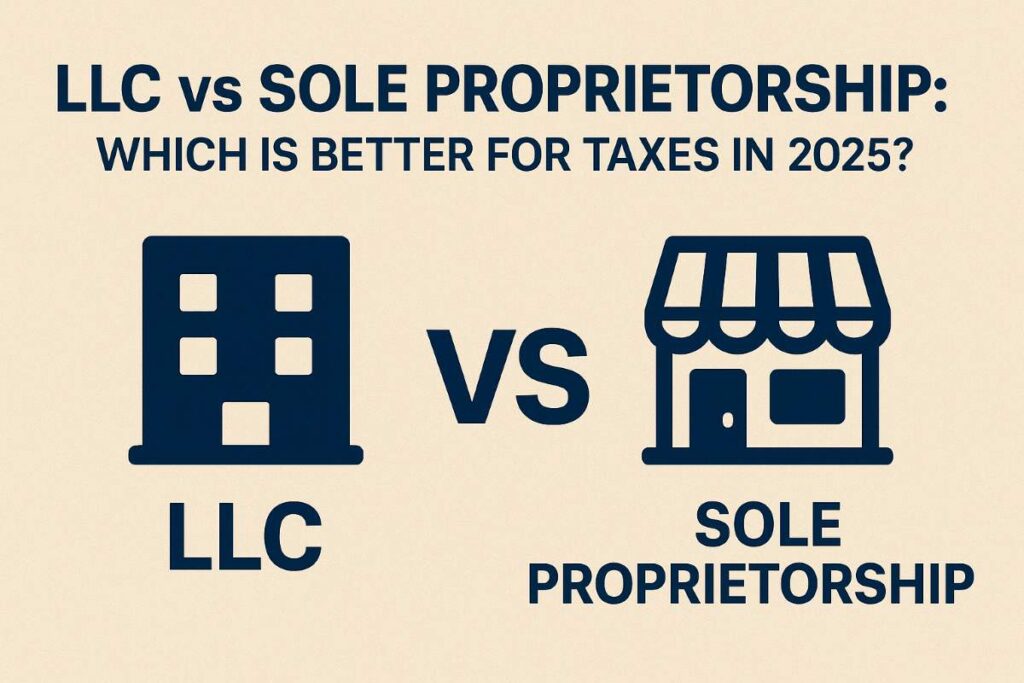Choosing between an LLC and a Sole Proprietorship is one of the most important decisions for small business owners in 2025. While both structures are popular, they differ significantly in terms of taxes, liability protection, and flexibility. In this guide, we’ll break down the key tax differences between LLCs and Sole Proprietorships to help you decide which option is better for your business.

What Is a Sole Proprietorship?
A Sole Proprietorship is the simplest business structure. It is owned and operated by a single individual with no legal separation between the owner and the business.
Key points:
- Easy and inexpensive to start.
- No separate tax filing – income is reported on Schedule C of the owner’s personal tax return.
- Owner is personally liable for business debts.
What Is an LLC?
A Limited Liability Company (LLC) is a legal entity that separates the owner’s personal assets from the business. It can have one or multiple members.
Key points:
- Provides liability protection for personal assets.
- Offers flexibility in how taxes are filed (sole proprietorship, partnership, or S Corporation election).
- Requires state registration and annual fees.
Taxation of Sole Proprietorships in 2025
For tax purposes, a sole proprietorship is a pass-through entity:
- Profits are taxed as personal income.
- The owner pays self-employment tax (15.3%) on net earnings.
- Business expenses can be deducted, but the tax burden can be high if profits grow.
Example:
If your business makes $80,000 in profit, you’ll pay federal income tax plus roughly $12,240 in self-employment tax.
Taxation of LLCs in 2025
LLCs provide more flexibility. By default, a single-member LLC is taxed like a sole proprietorship, while a multi-member LLC is taxed like a partnership. However, LLCs can also elect to be taxed as an S Corporation, which can reduce self-employment taxes.
LLC Tax Options:
- Default (Pass-through) – Profits pass through to owners’ personal returns.
- S Corporation Election – Owners pay themselves a salary and take the rest as distributions, reducing self-employment tax.
- C Corporation Election – Rare for small businesses, but possible.
LLC vs Sole Proprietorship: Key Tax Differences
| Feature | Sole Proprietorship | LLC (Default) | LLC (S Corp Election) |
|---|---|---|---|
| Tax Filing | Schedule C (Form 1040) | Schedule C or Partnership Return | Form 1120-S |
| Self-Employment Tax | 15.3% on all profits | 15.3% on all profits | Only on salary |
| Deduction Options | Standard business expenses | Broader flexibility | Salary + distributions |
| Personal Liability | Unlimited | Limited | Limited |
| IRS Scrutiny | Lower | Moderate | Higher (must pay “reasonable salary”) |
Which Saves More on Taxes in 2025?
- For low-income businesses (<$40,000 profit), a sole proprietorship is often simpler and cheaper.
- For medium to high income businesses ($60,000+), an LLC with an S Corporation election may save thousands in self-employment taxes.
- Example:
- Sole Proprietor with $100,000 profit → Pays self-employment tax on full $100,000.
- LLC taxed as S Corp → Owner takes $60,000 salary (taxed with SE tax), $40,000 distributions (no SE tax). Result: significant tax savings.
Non-Tax Considerations
While taxes are critical, don’t forget other factors:
- Liability Protection: LLC shields your personal assets, sole proprietorship does not.
- Credibility: Many vendors and clients view LLCs as more professional.
- Costs: Sole proprietorship has almost no setup cost; LLCs have filing fees ($50–$500 depending on state) and annual reports.
Pros & Cons Summary
Sole Proprietorship
✅ Simple and cheap
✅ Easy to manage taxes
❌ No liability protection
❌ Higher self-employment tax
LLC
✅ Liability protection
✅ Flexible tax options (S Corp election can save money)
✅ Better credibility
❌ More paperwork and costs
Conclusion
In 2025, whether you should choose an LLC or a Sole Proprietorship depends largely on your income level, risk tolerance, and long-term business goals.
- If you’re starting small and want simplicity, a Sole Proprietorship may be enough.
- If you expect growth and want to minimize taxes while protecting your personal assets, forming an LLC (possibly with an S Corporation election) is usually the smarter choice.
Call to Action
Looking to start your own LLC in 2025? Check out our detailed guide on How to Form an LLC in the USA as a Non-Resident and learn step-by-step how to register your company at the lowest cost possible.